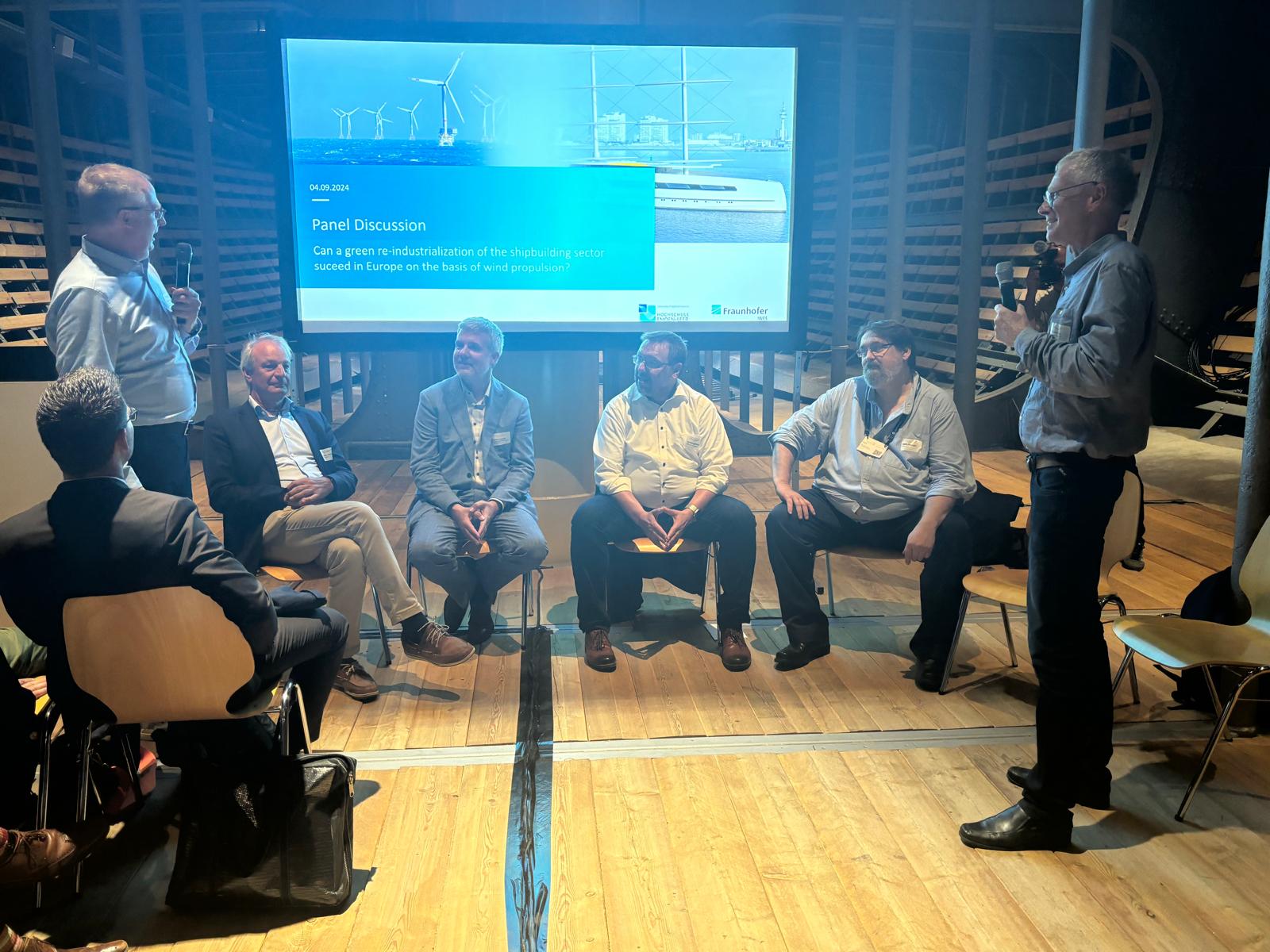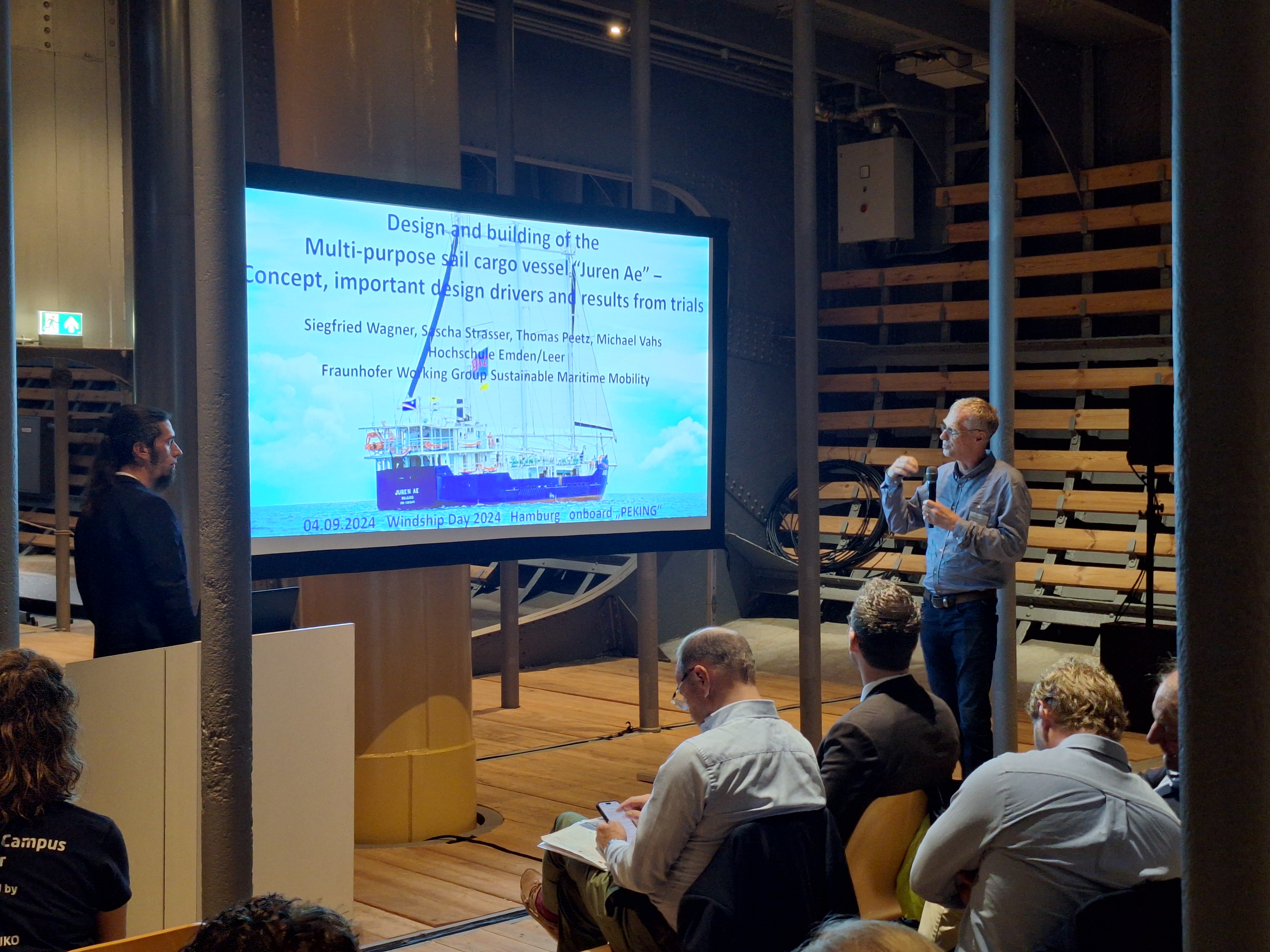‘Windship Day 2024’ conference on board the historic cargo ship PEKING
Wind propulsion is becoming increasingly popular in shipping
Setting sail for more sustainable, climate-friendly shipping - this was the motto of Windship Day 2024, which was held on Wednesday, 4 September 2024, on board the four-masted barque ‘Peking’ in Hamburg's Hansa Harbour. The event was organised by the Fraunhofer Working Group for Sustainable Maritime Mobility (under the joint leadership of Emden/Leer University of Applied Sciences and the Fraunhofer Institute for Wind Energy Systems IWES), MARIKO GmbH, the GreenShipping Lower Saxony Competence Centre, the International Windship Association and the German Harbour Museum, which is home to the ‘Peking’ at its exhibition site.


At the fully booked, all-day event in the cargo hold of the historic cargo sailing ship with 100 participants from the global shipping industry, various aspects of the increasing use of wind propulsion technologies were discussed. In addition to political and regulatory framework conditions, the programme of presentations focused on the latest findings from research and development as well as practical insights from maritime engineering firms and providers of wind propulsion technologies. The various presentations and discussions repeatedly highlighted the enormous potential of innovative wind propulsion technologies for more climate-friendly shipping due to the freely available quantities of wind in many shipping areas and the associated savings potential.
The event was characterised by top speakers from politics, research, shipping and the maritime industry. In addition to professional sailor Boris Herrmann, who outlined his vision of the future of numerous sailing cargo ships on the world's oceans in an inspiring video message, Dieter Janecek, the German Federal Government's Coordinator for Maritime Economy and Tourism, also took part in Windship Day 2024. During a panel discussion, the member of the Bundestag spoke out in favour of the increased promotion, development and use of sustainable technologies: ‘I welcome events like Windship Day because a shift away from fossil fuels towards alternative energy sources and innovative propulsion systems in shipping is essential if we are to achieve the important climate protection goals.’ This message was well received by Katja Baumann (Managing Director of MARIKO GmbH): ‘The visit by Mr Janecek and other important figures from the maritime industry shows the relevance of the topic and our event. I hope that the development and use of wind propulsion technologies will also be recognised and promoted in the German National Action Plan for Climate-Friendly Shipping, which is currently being drawn up.’
Fortunately, the use of sailing technologies on the way to sustainable maritime mobility is already clearly on the rise internationally and is making steady progress. Numerous new build and retrofit projects are currently being announced around the world. Gavin Allwright (Secretary General of the International Windship Association) gave a detailed insight into this in his presentation: ‘Wind propulsion technologies are neither yesterday's nor tomorrow's news - now is the time for shipping to use wind energy as a fuel for maritime decarbonisation. And we can see that in the figures, because last year alone there were more than 40 new installations of wind propulsion technologies on commercial ships and our forecasts predict around 10,000 ships worldwide with installed wind (auxiliary) propulsion by 2030 and up to 40,000 ships by 2050.’
One of the windships already in operation is the multi-purpose sailing vessel ‘Juren Ae’, which was designed and built for the Marshall Islands in the South Pacific. The associated design and construction process was presented by a research group from Emden/Leer University of Applied Sciences led by Prof. Captain Michael Vahs, as the ‘Juren Ae’ is ‘climate-friendly shipping made in Germany’. Vahs and his team presented important design factors and the initial results of the sea trials and expressed their desire for more examples of windships to be realised in German shipping: ‘Unfortunately, with a national view we are still a little bit dominated by reluctance and scepticism with regard to the use of wind propulsion technologies, despite proven fuel-saving potential and marketable ship concepts.’
The actual performance of wind propulsion technologies such as Flettner rotors was the focus of the presentation by a research team led by Prof Dr Jann Strybny (also from Emden/Leer University of Applied Sciences), who together with Michael Vahs is responsible for the scientific management of the Fraunhofer Sustainable Maritime Mobility working group. Part of the team's development work is an extensive and ongoing field measurement campaign, which is being carried out by the Fraunhofer IWES. Jann Strybny and his team also outlined methodological approaches and referred to the state-of-the-art research facilities at the Maritime Campus Leer: ‘Research and development for sustainable shipping is being driven forward in Leer. With our expertise in maritime hydrodynamics and aerodynamics, automation and systems technology as well as materials technology, we focus in particular on wind propulsion systems, design concepts and scientific studies for emission-free shipping.’
Overall, Windship Day 2024, which had been fully booked for weeks, was a more than successful event with a wide range of topics and numerous experts from the international shipping industry. The participants agreed that innovative propulsion alternatives are needed against the backdrop of maritime climate protection and rising energy prices, and that wind propulsion technologies are an important building block on the way to climate-neutral shipping. The hosts of the German Port Museum, led by its CEO Prof Dr Hans-Jörg Czech, were also satisfied: ‘We are delighted with the great interest in Windship Day at Peking and hope that the topics and ideas discussed in this inspiring environment will contribute to achieving the climate protection goals in shipping.’
Last modified: